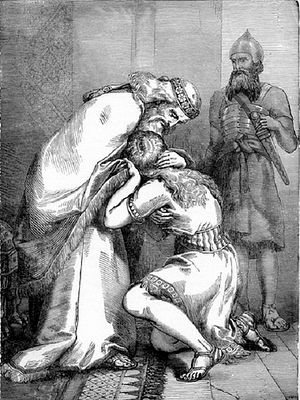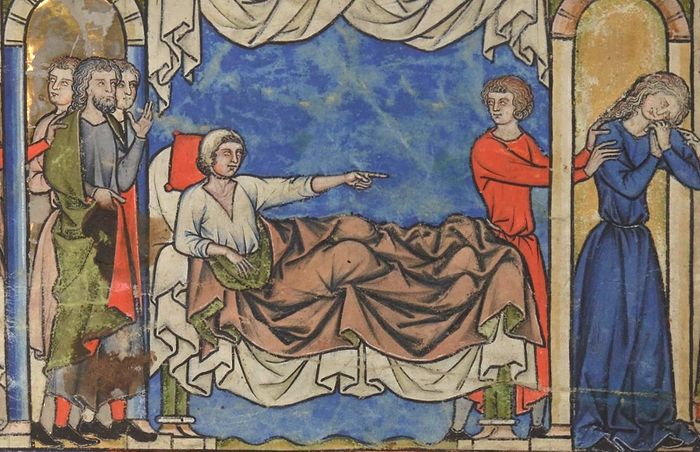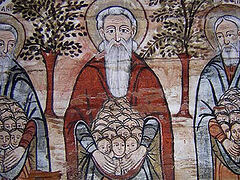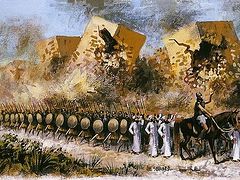In 2 Kings1 there is a story about the children of King David, Amnon and Tamar. The story is very tragic: The lives of these young people were maimed by lust. And we perhaps won’t find another such story in the Bible that could so definitely show the passion of lust in its maturation and action, and so clearly testify to the very essence of this passion.
Tamar was very beautiful, and Amnon fell in love with her. At the advice of a friend, he feigned illness, and when his sister came to visit him, he attacked and raped her. A few minutes after the crime, Amnon felt a sharp hatred for Tamar in place of the previous “love.” He summoned a servant and ordered that the disgraced sister be driven out. The order was fulfilled. The servant led her out and locked the door behind her. And Tamar sprinkled ashes on her head, rent the colorful clothes she was wearing, placed her hands on her head, and so went and wept (2 Kg. 13:18-19), the Bible says.
This story could well be called archetypal. In all the details of this Biblical story, a deep psychological truth shines through. Everything is exactly the same as it happens in our life; for example, mistaking the urges of lust for love. Amnon loved her (2 Kg. 13:1), it says at the beginning, but then the true content of such “love” is revealed to the reader. As soon as lust finds satisfaction, it reveals its true nature—hatred for man. Then Amnon hated her with the greatest of hatred, so that the hatred with which he hated her was stronger than the love he had had for her (2 Kg. 13:15).
Using another as a means of satisfying passions, the fornicator hates the soul in the other, refusing to recognize a living person with his own fate, experiences, dreams, hopes, and desire for happiness. He sees before him not a person, but a source of automatic satisfaction. It’s a demonic view of God’s creation, a view from the underworld. There is no love here, but there is the desire to use someone and then cast her aside as unnecessary.
In general, every passion is from the devil, and he himself is a destroyer who hates mankind. Therefore, the basis of any passion is hatred, and its purpose is the destruction of man, both in body and soul. The thief cometh not, but for to steal, and to kill, and to destroy (Jn. 10:10), the Savior said of the devil and his servants. And it turns out you can destroy even after murder. There is the second death, spoken about in the book of Revelation (21:8). It is to this spiritual death that we are led by the passions, among which lust occupies the main spot.
It’s no wonder the genius Tolstoy noted that when Anna Karenina and Vronsky first committed the sin of adultery, Vronsky, looking at Anna, “felt what a murderer feels when he sees the body he deprived of life.” Vronsky was a spiritual murderer. He took Anna’s soul. The body, no longer needed by anyone, lived several more years by inertia and also died. Such is the action of passion: First the soul, then the body. It’s a monster devouring the entire person, leaving not a trace.
***
The essence of the passion of lust is the separation of physical intimacy from the spiritual. In family life, the two sides come together, forming the unique miracle of the marital unity of two. Lust doesn’t seek spiritual and bodily communion, but teaches us to perceive the desired person as a piece of meat that can be discarded after satiety. In most cases, premarital sexual relations end with this. Love without responsibility is a lie. And Amnon didn’t love Tamar—he simply desired her blossoming young body. And, having sated himself, he turned away, like a dog turns away from a gnawed bone.
Sometimes at meetings and talks I hear the question: But why not? Why does the same action that the Church blesses within marriage become bad outside of it? Surprisingly, girls ask this more. It’s those same girls who in time will be gnawed on by lustful dogs who then indifferently turn away from them. Then, perhaps, an understanding will come—only, what’s the point of your belated epiphany? Yes, the Lord won’t leave you if there is repentance. But you can hardly wait for your womanly happiness, foolish girl.
It’s worth noting Tamar’s reaction to the loss of her maidenly honor. For her, the loss of her virginity was the collapse of her life. And Tamar sprinkled ashes on her head and rent the many-colored clothes she was wearing, placed her hands on her head, and so went and wept (2 Kg. 13:19). In the ancient world, losing your innocence before marriage really was a disaster. No one would take a dishonored girl, no one needed her, because her honor and happiness have been stolen. The ancients clearly understood the impossibility of a marital union and a normal spousal life with such a woman. Tamar understands that she will remain forever unmarried and childless and carries out, in fact, a funeral lament for her womanly happiness.
Alas, for many ladies today, Tamar’s state is quite tolerable and even sometimes desirable. A “free life” without a husband or offspring, without any kind of responsibility—this is the ideal of an emancipated consciousness! Many today simply wouldn’t have understood the weeping of the besmirched daughter of David. “Well, just think… Preserve yourself for whom? If both sides are for it, why not have some fun?” By the way, just half a century ago, Tamar’s way of thinking was natural for residents of our villages. But now… far from it.
***
 David forgives Absalom Let’s look at the chain reaction of sin that began after Amnon’s crime. The rapist went unpunished because he was the king’s beloved son, the firstborn. But his brother Absalom held a grudge against him because of his sister’s desecrated honor, and two years later he killed Amnon in his home. Absalom himself fled from his father’s anger, but was soon forgiven and returned. However, the relationship with the king was broken. Absalom, outraged by David’s biased relationship towards his sons, started a rebellion against his father. A civil war was unleashed, during which Absalom was killed.
David forgives Absalom Let’s look at the chain reaction of sin that began after Amnon’s crime. The rapist went unpunished because he was the king’s beloved son, the firstborn. But his brother Absalom held a grudge against him because of his sister’s desecrated honor, and two years later he killed Amnon in his home. Absalom himself fled from his father’s anger, but was soon forgiven and returned. However, the relationship with the king was broken. Absalom, outraged by David’s biased relationship towards his sons, started a rebellion against his father. A civil war was unleashed, during which Absalom was killed.
The effects of a passion, like a toxin that poisons the air, spread very far, to all those who are connected by blood or friendly ties with the one who bears the passion. Passions harm not only the criminal and his direct victim, but also destroy the relationships of those close to him. A man who indulges his passions not only kills himself, but also necessarily ruins the lives of those around him.
All the thin threads of this complicated picture will be untangled later by the Lord at the Dread Judgment. Who with whom and when, whom it affected and how, what are the immediate and long-term consequences—He will sort everything out. And we, who are now weaving the pattern of the actions of our life, should remember that our sin is not only our sin, and our victory over passion belongs not only to us. We are all connected by an invisible web of mutual influence and responsibility for each other.
***
In the story of Amnon, an important role is played by his friend Jonadab. It was this man who designed this crime for the king’s son. Oh, these friends, whose advice sometimes causes greater harm than the machinations of enemies! Friends rendered a poor service not only for the son, but also for David’s grandson, King Rehoboam. At the advice of young friends, he refused to meet the requests of the people to reduce the tribute and provoked one of the main tragedies of ancient Israel—the division into the Northern and Southern kingdoms.
How many quarrels and scandals, fornications, infidelities, and broken relationships lie on the conscience of such friends who gave “necessary and useful” advice! How careful we must be with our words even to the sincerest friend, especially if they relate to matters of the heart. Alas, Amnon listened to the wrong person and paid a cruel price.
***
The story of Amnon’s sin very clearly shows the blindness into which passion plunges a man. When Tamar realized what her brother wanted from her, she tried to reason with him. First, this poor girl appealed to the moral rules of the life of Israel, and then to the usual feeling of pity that any person would have, and then recalled the undoubted punishment for the criminal himself: Nay, my brother, do not force me; for no such thing ought to be done in Israel: do not thou this folly. And I, whither shall I cause my shame to go? and as for thee, thou shalt be as one of the fools in Israel (2 Kg. 13:12-13). But her brother, inflamed with lust, wouldn’t hear her. Tamar tried to take advantage of her last chance to avoid dishonor, offering herself to Amnon as a legitimate wife: I pray thee, speak unto the king; for he will not withhold me from thee (2 Kg. 13:13). But alas, it was all useless. It was no longer Amnon who controlled the situation, but lust, which had taken possession of him.
How much this or that passion can control a man is very well seen in the prison where I go with a priest to have talks with prisoners. Most of the convicts are perfectly normal, sensible people. But each one has his dominant passion that led him to jail. For example, I remember one triple murderer. He’s a believer, Orthodox, and he confesses and communes. But, he’s terribly struck by the passion of anger! As soon as something goes even slightly not his way, his eyes turn black, his face deforms, his huge fists clench nervously… Three murders were committed in an angry outburst, with three subsequent sentences. Whether or not he’ll be able to resist the next temptation, I don’t know. In this state, a man doesn’t really have any control. He becomes completely obedient to his passion.
Lust has no less power than anger. It’s cunning as a snake and able to hide and mask itself. Therefore, the Apostle Paul counsels us to flee from sexual immorality (cf. 1 Cor. 6:18). Do you hear? Don’t even fight with it—but flee from it! Flee temptation, from the source of allurement, from dirty thoughts and even the potential opportunity to be seduced; because the enemy is too dangerous, strong, and cunning.
***
Even in our times there are still Amnons—rapists and seducers. In any case, any man, blinded by his passions and driven by them to sin is in some way an Amnon. And there have always been and always will be Tamars, inasmuch as there are Amnons. And our souls, which we corrupt with passions, are in some way Tamar—initially beautiful, but later corrupted and unhappy.
It would be good for all elementary and high school students to read about the tragedy of Amnon and Tamar—to read it together with ascetic commentaries. Perhaps, thanks to such a conversation, some potential Amnon won’t commit his crime, and some girl who could have become a Tamar will preserve her virginity until marriage and find her womanly happiness. After all, the enemy, about which we’ve forewarned, is already half neutralized. Forewarned means armed. And young people of the age of Amnon and Tamar need such a warning, and indeed all adults too, because lust comes for everyone without exception. Remembering David’s unfortunate children, we also warn ourselves.





